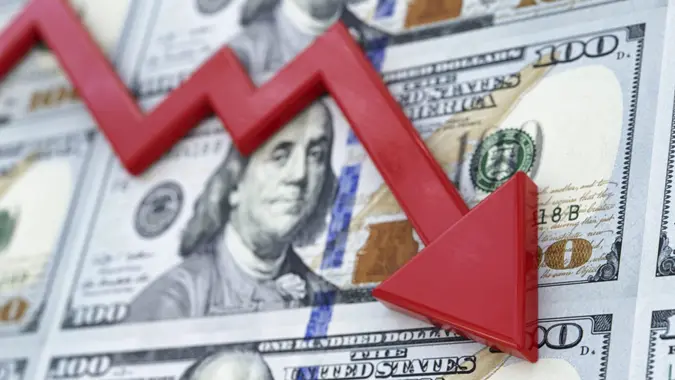Financial Planners Say a Recession Is Coming: 3 Reasons They’re Not Worried About It

Commitment to Our Readers
GOBankingRates' editorial team is committed to bringing you unbiased reviews and information. We use data-driven methodologies to evaluate financial products and services - our reviews and ratings are not influenced by advertisers. You can read more about our editorial guidelines and our products and services review methodology.

20 Years
Helping You Live Richer

Reviewed
by Experts

Trusted by
Millions of Readers
Mark Zandi, chief economist at Moody’s Analytics, recently warned that the economy is on the brink of entering a recession, as reported by Newsweek.
GOBankingRates spoke with financial experts who also believe a recession is on the horizon, based on recent economic trends, consumer spending habits and other indicators, but aren’t overly concerned. Here are reasons why these experts aren’t worried despite believing that a recession is possible in the near future.
Recessions Are a Normal Part of the Economic Cycle
Urban Adams, investment advisor at Dynamic Wealth Advisors, said recessions are a natural part of the economic cycle (expansion, peak, contraction and trough). As a result of this, there’s nothing to worry about because they will continue to happen. “What I work on with my clients is to invest assuming that the stages of the economic cycle will occur (not if or when), and that there’s no accurate way of predicting when we will move from one stage to the next, or how long any stage will last,” he added.
Since a recession is a regular part of the economic cycle, it means that you shouldn’t worry, as it’s easier to plan for one than to hope it never happens. Even though a recession can impact every individual differently depending on the industry they work in and where they live, the positive aspect is that it will pass through eventually as the economic cycle continues.
The U.S. Economy Is Resilient
Ben Waterman, registered investment advisor and CEO of Strabo, stressed that the U.S. has proven itself to be remarkably resilient in recovering from downturns. “This is especially true now as both consumers and businesses enter the period from a position of strength: employment is high, corporate balance sheets are healthier than in past cycles, and many consumers have built up savings buffers from recent years of prosperity,” he said.
With a resilient economy, a recession hasn’t been announced for the last few years, as the jobs report and consumer spending continue to remain strong. Even if a recession were to be announced, it’s believed that the economy is resilient enough to bounce back. As a result, financial planners aren’t worried about the recession being anything more dire than what has been experienced in the past.
Recessions Create Opportunities
“It’s also worth noting that recessions, while uncomfortable at the time, create opportunities,” Waterman said. Waterman advised that you see a recession or economic downturn as a sale on assets. “When investment prices fall, you get the chance to buy quality assets at a discount, and the rebound can often provide many years of gain in one go,” he added. While a market pullback can be stressful at the moment, history has proven that these are always temporary and that long-term investors come out on top. The next recession could be the perfect opportunity to make investments that you’ve been holding off if you have some funds set aside.
How You Can Prepare for a Recession
While it’s impossible to determine if and when a recession will be declared, two crucial tips will help you prepare for the worst-case scenario.
Live Within Your Means
Adams emphasized the importance of ensuring that clients live within their means and maintain an emergency fund, in addition to their retirement and non-retirement investments. You want to do your best to continue saving and putting money aside so that you’re financially ready to withstand an economic downturn. You want to be prepared for a possible recession by having your finances organized and living well below your means so that you’re not stuck trying to figure out how you’ll pay the bills if your employment suffers.
Try Not To Panic
“Having to tap into investments during a recession can be especially damaging to future financial security,” Adams explained. The main takeaway from this article should be that you shouldn’t panic if a recession comes, since this is to be expected at some point. Many investors panic when the market drops and they start selling off their stocks. They end up missing out on gains when the market bounces back. While it won’t always be easy at the moment, try to stay calm and remember that the recession will eventually come to an end.
 Written by
Written by  Edited by
Edited by 

























